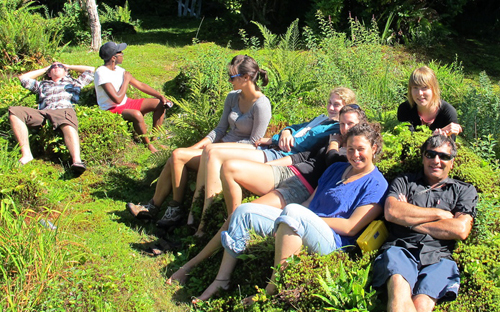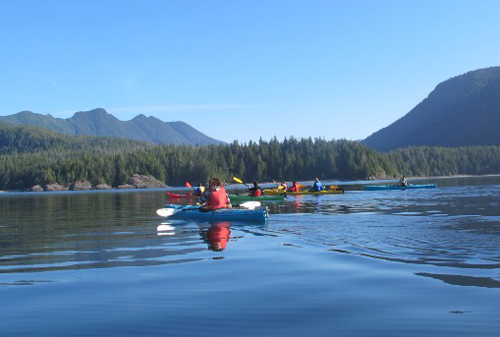
If a tree falls in the forest, does anyone hear it over the din of their own arguing? Listening to differing perspectives on environmental issues – and perhaps helping opposing players move toward common ground – is the purpose of a new U of G philosophy field course launched this summer in British Columbia’s Clayoquot Sound.
Called simply the philosophy field course, the fourth-year undergrad offering is a first for Guelph and perhaps for any philosophy department in Canada, says Prof. Stefan Linquist.
The philosopher of science led a 10-day excursion in late August with eight U of G students: half from philosophy, half from biological sciences. Like modern-day Socrates, they met to talk with representatives from forestry and fish farming industries, environmental groups, First Nations and community development agencies.
The results were surprising for many students and the professor, too.
From fish farming to logging to tourism, industries and their related environmental issues in Tofino on Vancouver Island’s picturesque west coast turned out to be more nuanced for Abby Wilson. Earlier, the fourth-year philosophy major had expected more clear-cut answers about the sustainability of these endeavours.
“The more we talked to local people and groups, the more I realized that these issues are deeply complex and deeply personal,” she says. “Everyone we talked to was committed to some form of sustainability. However, everyone had slightly different versions of what sustainability meant and entailed.”
Linquist had expected that industry representatives might be defensive. Instead, many proved keen to share information about changing practices. At the same time, environmental groups were reluctant to credit those changes. “They were arguing against an industry of 20 years ago,” he says.
In 1993, protestors in Clayoquot Sound staged Canada’s largest act of civil disobedience against logging of old-growth forests.
Says Curtis Marcoux, now in his fourth year of an ecology major: “I was surprised at how open people were in the community to discussing current issues, how hospitable they all were and seeing the passion in their eyes and hearing it in their voices as they shared their perspectives.”
The professor thought a field course would be a good way for students to look at real-world problems and better appreciate diverse arguments and viewpoints. “I realized there were interesting discrepancies in the way these different groups view each other,” says Linquist, who grew up in Vancouver and now visits the Tofino area regularly as a director of the Ucluelet Aquarium Society.
Unlike, say, an environmental field course stressing biology or science, he says the emphasis here lies in using analytical skills honed in humanities classes. Students probed at assumptions, evidence and arguments used to justify viewpoints on issues.
Says Wilson: “Most philosophy courses tend to be centred around understanding old texts and academic papers. This course was a chance to work on philosophical problems in a very relevant setting. The issues we were talking about related to people’s livelihoods and to the immediate landscape.
“The abstraction that is sometimes present in philosophical discussions was absent here. Everything we talked about seemed very important, very relevant, very meaningful.”

The trip wasn’t all talk and no play. Highlights included 800-year-old cedars, a sea kayaking expedition and an overnight stay in a First Nations longhouse. But they spent most of the trip housed at a hostel in Tofino.
Linquist hopes the trip will help to bridge distance between stakeholders in the area. He plans to share students’ written reports with the Tofino groups.
He also co-teaches a graduate course on the philosophy of biology and teaches undergrad courses in philosophy of the environment.
For more information about the philosophy field course, including Linquist’s blog, visit http://biophilosophy.ca/Teaching/philosophy4160.html.
To listen to a radio interview with Linquist on the different ways that scientific evidence is understood from the perspectives of industry, environmentalism and First Natioins, visit http://pioneerradio.wordpress.com/2011/10/17/episode-twenty-eight-%E2%80%94-the-powers-that-be/.